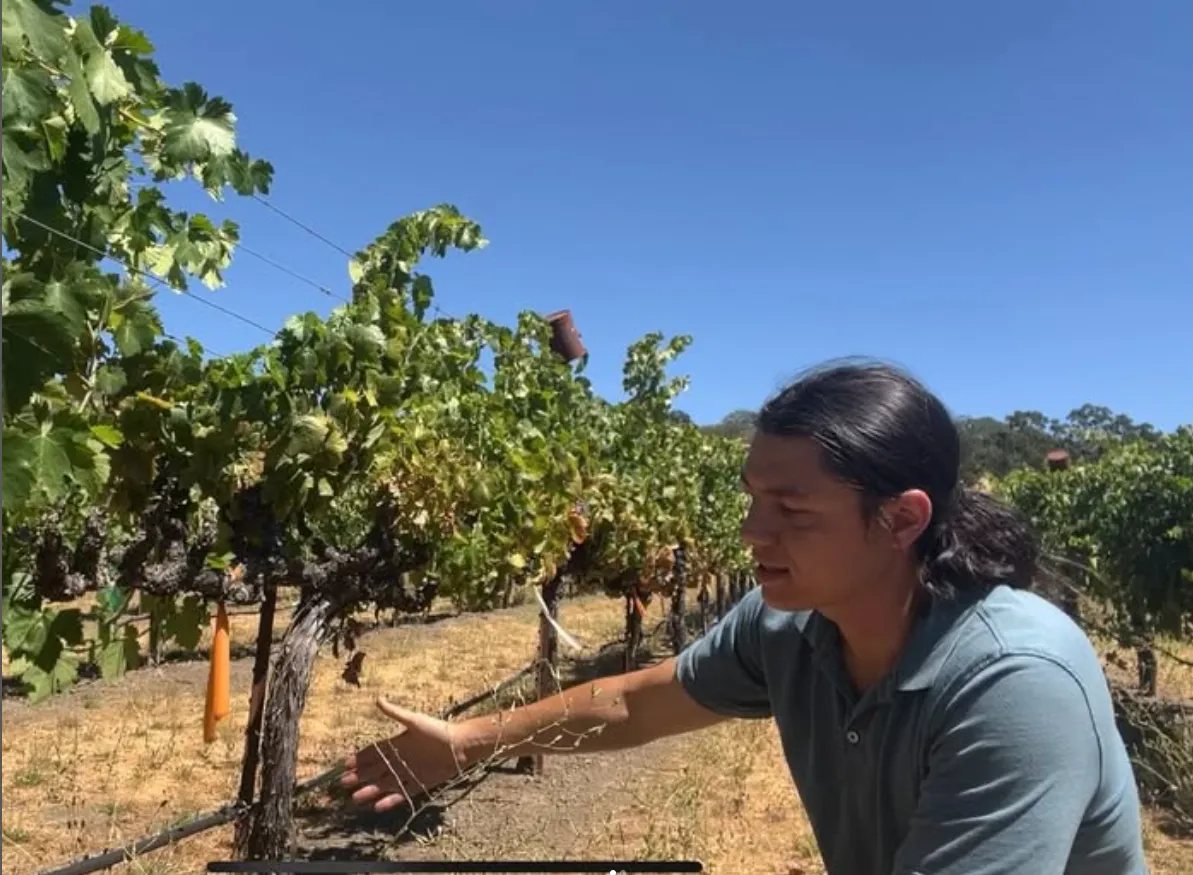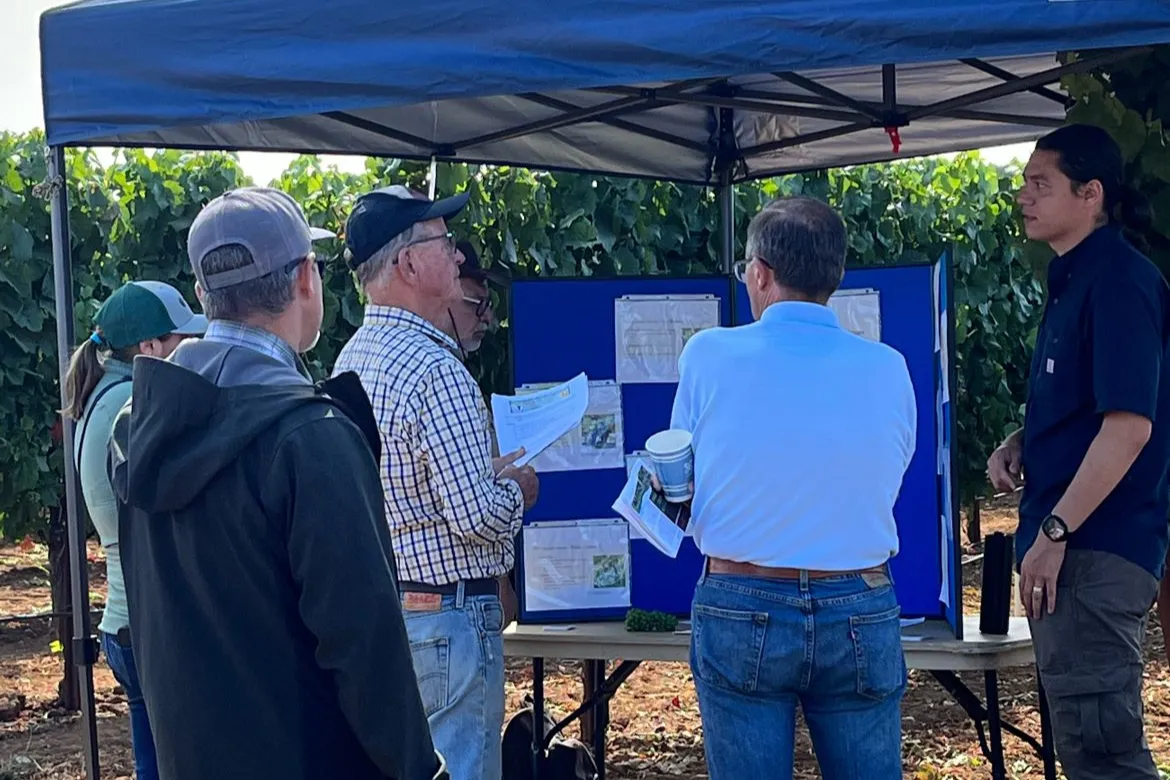UC Cooperative Extension advisor studies solutions that minimize impacts of extreme weather

The sun is setting behind the rolling hills of one of Lake County's picturesque vineyards. The postcard-perfect scene wraps up another day at the office for Christopher Chen, University of California Cooperative Extension's integrated vineyard systems advisor for Lake, Mendocino and Sonoma counties.
Now entering his third year in that role, Chen often can be found at vineyards across the region, measuring the impact of drought-resistant rootstocks, collecting data on temperature fluctuations and carefully examining the vineyard’s canopy.
All these observations and measurements are part of a larger mission – to ensure that the very vines that produce the region’s world-renowned wines can thrive amid the challenges of climate change, wildfires and water scarcity.
“Agricultural production, and particularly viticulture and enology, represent a large industry in California’s North Coast counties, and the impacts of extreme climate conditions exacerbate the challenges associated with agriculture production and threaten the well-being of wine and grape industries,” Chen explained. “Our goal is to minimize the impacts of extreme weather in vineyards; we focus on identifying practical and applicable solutions to issues resulting from extreme environmental damage to winegrape crops.”
During the April sessions of both the Lake County and Mendocino County Board of Supervisors meetings, Chen will showcase his research and offer valuable insights into the challenges facing the viticulture community, including his critical work on smoke taint, climate adaptation and water management strategies.
Protecting the lifeblood of the region: Wine grapes and sustainable practices
Wine grape production is central to the economic vitality of Mendocino and Lake counties, but the industry faces increasing pressure from rising temperatures, water shortages and the unpredictable threat of wildfires.

“A significant part of my research is helping local vineyards adapt to these environmental shifts and working on ensuring the long-term sustainability for the industry,” Chen said.
One of his key areas of focus is smoke taint, a phenomenon caused by volatile organic compounds (VOCs) and phenolic compounds released by wildfires and prescribed burns. These compounds can severely impact the quality of wine, presenting a significant risk to wine grape production.
Chen’s ongoing research at the UC Hopland Research and Extension Center – operated by UC Agriculture and Natural Resources – aims to quantify and mitigate this risk. In his preliminary study, he found that vineyards located more than a quarter of a mile away from prescribed burns showed a 31% reduction in smoke exposure, offering hope for managing smoke taint risks in the future.
Practical solutions for a changing climate
Beyond fire risk, Chen is innovating viticulture practices that will help vineyards adapt to a variety of climate challenges. His studies on rootstocks for drought recovery, along with his investigation into frost protection strategies, are helping local grape growers maintain production and improve efficiency without over-relying on precious water resources.
These studies are essential as California’s winegrape industry grapples with the growing impacts of climate variability. Chen’s research is not only providing solutions for today’s challenges but is also laying the groundwork for a more resilient wine industry in the years to come.
“It’s not just solutions to today’s problems we are investigating and educating stakeholders on, we also explore the challenges that are likely to become more prevalent in vineyards,” Chen said. “In years where water availability is sufficient, thinking about prolonged drought can be difficult, but it’s concerns like this that need to be in the forefront of our management and planning going forward so we are prepared to deal with them when they arrive.”

Shaping the future of viticulture
Chen’s dedication to the viticulture community goes beyond research. Through his role at UC Cooperative Extension, he serves as a vital resource for local growers, offering consultation, outreach and educational events designed to support the economic, environmental and social sustainability of the region’s wine industry.
“Chris has been an incredible resource, particularly when it comes to extending knowledge and practical solutions,” said Alex Alper, a local vineyard manager. “His ability to translate complex research findings into down-to-earth, actionable advice has made a real difference in how I manage challenges like climate variability and pest pressures.”
As the region’s wine industry continues to grow and evolve to meet new challenges, Chen’s expertise is guiding it toward a more resilient and sustainable future.
“This position not only allows me to explore my interest in grapevines, but it also gives me the opportunity to help grape growers gain the information they need to solve the problems of today and of the future,” Chen said. “I feel incredibly fortunate to have the chance to utilize my knowledge in this way and also to be able to meet and help the people of California’s North Coast viticultural regions.”
For more information, visit Chen’s profiles on LinkedIn, Instagram and BlueSky.
About UC Cooperative Extension
UC Cooperative Extension (UCCE) provides research-based resources and expertise to enhance the well-being of California residents. UCCE supports agricultural, environmental and community-based initiatives that promote sustainability, resilience and innovation throughout the state.

